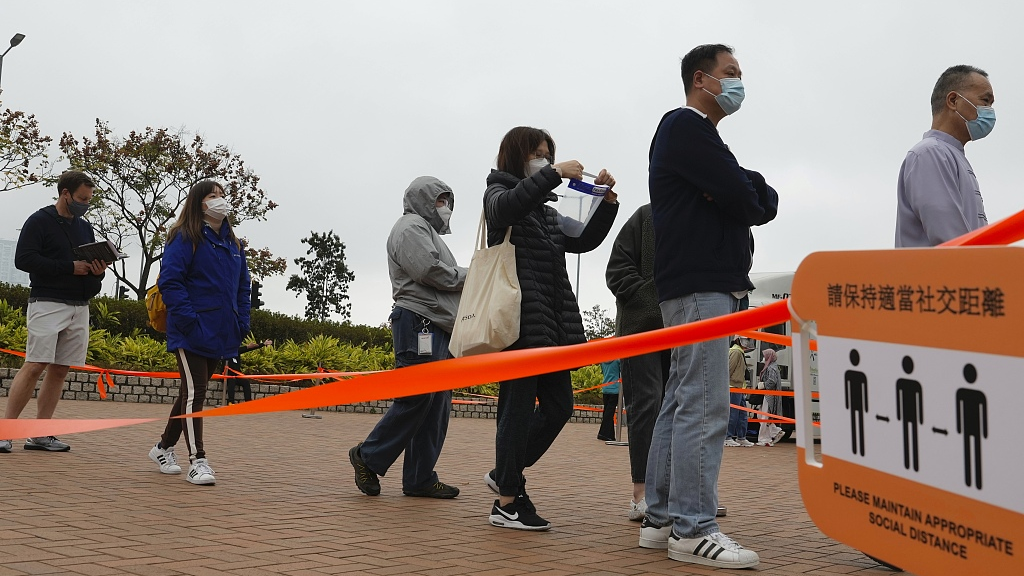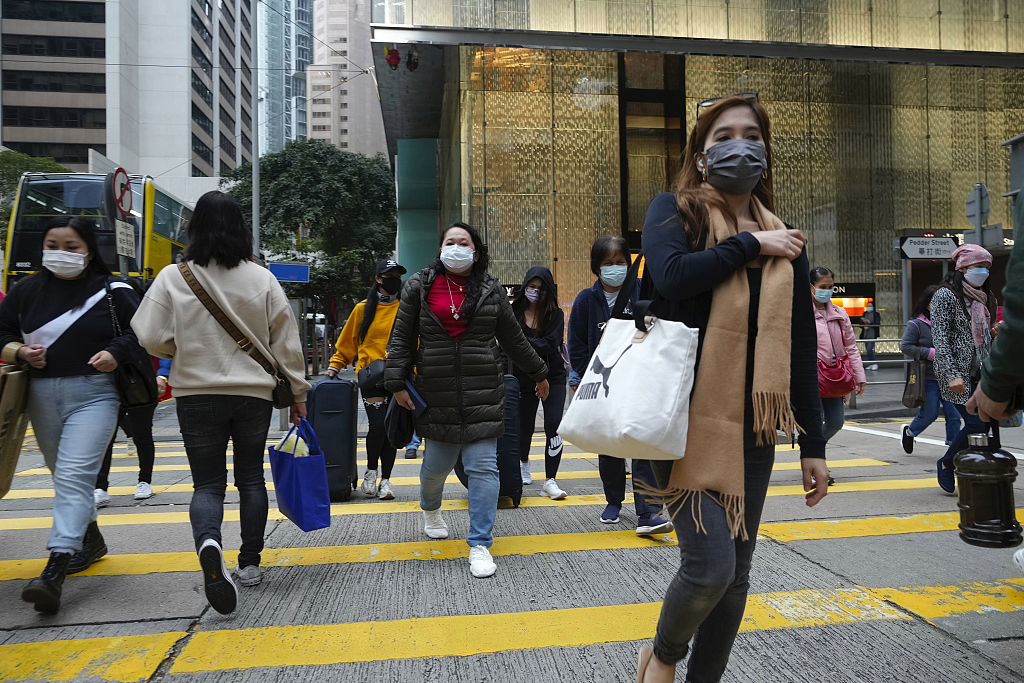
Residents queue up for nucleic acid testing at a temporary station in Hong Kong, February 13, 2022. /CFP
Residents queue up for nucleic acid testing at a temporary station in Hong Kong, February 13, 2022. /CFP
Editor's note: Zhu Zheng is an assistant professor of constitutional law and politics at China University of Political Science and Law. The article reflects the author's opinion, and not necessarily the views of CGTN.
COVID-19 has dealt a heavy blow to the Hong Kong Special Administrative Region (HKSAR). On February 12, the HKSAR reported more than 3000 new COVID-19 cases, up from Friday's 1,325 and Saturday's 1,514 despite the most stringent restrictions yet. With another 1,500 or so tested positive in preliminary tests, Hong Kong's count will increase more sharply in the near future.
According to reports, territory hospital beds are already at around 90 percent occupancy, and isolation facilities are at their maximum. If the situation keeps deteriorating, Hong Kong's medical capacity will be so stretched that the authorities will find themselves in a difficult situation to curb the resurgence.
Therefore, senior officials led by Hong Kong's chief secretary John Lee were in Shenzhen on Saturday, working out the way the central government and neighboring provinces could assist.
Officials from the Chinese mainland and the HKSAR are "on the same wavelength," Lee said after the meeting. The central government has agreed to provide isolation facilities, protective equipment, hospital beds and lab personnel. Moreover, it has promised to ensure the city's supplies of vegetables and fresh produce.
Although epidemiologists estimated that the number of infections could be increasing in several weeks' time, many believe that the HKSAR government could eventually bring the infection count back to zero – with the central government's help.
There are some matters worth contemplating before making such an optimistic forecast.
First of all, should the HKSAR follow the Chinese mainland's model by implementing a full lockdown for around two months? To some experts, a full mainland-style lockdown would be the only way to contain the pandemic, but they also warned that this is hardly a definitive fix, because Omicron could find its way back again soon after.
The HKSAR should be aware that a full lockdown for such a long time will further drag down the city's economy, which is already in deep freeze.

A view of the HKSAR, February 13, 2022. /CFP
A view of the HKSAR, February 13, 2022. /CFP
Secondly, should the HKSAR keep suppressing every COVID-19 outbreak instead of trying to live with the virus? Yes, the Omicron variant is not as severe as Delta, but it is proven to be tougher to keep under control. So, this is not the reason that Hong Kong should remove all restrictions.
As a neighbor, Hong Kong's pandemic spread will impact Shenzhen. After two Delta infections were identified on January 7, 2022, Shenzhen imposed tough restrictions, and all 12.5 million residents have undergone testing. If Hong Kong lifts testing requirements and eases social-distancing rules, the Hong Kong-Shenzhen border will not reopen. It is for this reason that Hong Kong should be put on high alert and stick to its current dynamic "zero-infection" approach.
Finally, winning a long-term war, as opposed to a single battle, takes strategy and planning. This requires Hong Kong to articulate a more concrete and visionary strategy to succeed against the virus, rather than relying on the mainland to come to its rescue. More broadly, the HKSAR authorities should pen down more goals than merely suppressing COVID-19 under the present conditions, be it creating conditions for an open border with Shenzhen, universal vaccination, or meeting the economic needs of those vulnerable in Hong Kong.
With the central government's help, Hong Kong will curb the fifth wave of the virus, but in a long-term view, the city should come up with measures that are more independent, flexible and efficient to refresh the city's energy. It is on these conditions that a positive vision of the city will come true.
(If you want to contribute and have specific expertise, please contact us at opinions@cgtn.com.)

